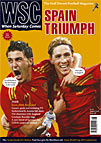 Greece did as badly at Euro 2008 as many had predicted they would four years earlier. But despite his champions' poor performance, the knives are not out for Otto Rehhagel, as Paul Pomonis explains
Greece did as badly at Euro 2008 as many had predicted they would four years earlier. But despite his champions' poor performance, the knives are not out for Otto Rehhagel, as Paul Pomonis explains
You can safely recognise a team in deep trouble, the moment their coach turns to the supernatural for assistance. “Boys, pray for us,” Otto Rehhagel asked the Greek press before the crucial match against Russia. Unfortunately, no amount of divine intervention could save the Greece team this summer. To the surprise of many, their defence of their 2004 European title ended in abject failure, one that brought back memories of the legendary fiasco at the USA 94 World Cup.
Coming to the tournament, the team looked solid: the qualifying campaign had been exceptionally successful and the new team “King Otto” was building had proven their mettle by overcoming what in Greece is considered the ultimate sporting humiliation, namely a home defeat to Turkey. Last April, following a friendly win over Portugal, Greece climbed to eighth in FIFA’s world rankings. Things looked promising for the reigning champions, especially as they were not burdened with unreasonable expectations. Or so it was thought.
Actually, what the public expected from the Euro 2008 squad was proof that the triumph in Lisbon four years earlier was no fluke. But that’s precisely what it was. The players instinctively realised this, hence the empty bravado of their pre-tournament interviews: “We are the reigning champions, we have nothing to prove,” declared Kostas Katsouranis upon the team’s arrival in Austria, pretending to ignore that precisely due to their status, the Greeks had everything to prove in a world where the difference between underdog and upstart is a very fine one.
Not surprisingly, faced with a challenge they were mentally unprepared to deal with, Greece fell back on the one tactic that had served them so well in the past: an over-cautious game plan that relied on sturdy defensive work and left little room for flair or imagination. Effective or not, this was hardly the way for the Greece team to convince the growing number of doubters that they had been worthy champions.
It took less than 45 minutes for the plan to unravel. The spontaneous booing that burst out during their tournament debut against Sweden drained the team of their limited reserves of confidence. Zlatan Ibrahimovic’s brilliant goal sealed the fate of a team that mentally had capitulated much earlier. In the post-match interview, a shaken Rehhagel tried to defend his tactics by claiming that a more adventurous approach would have certainly resulted in Greece trailing 5-0 at half time. Candid, but in no way morale-boosting.
From then on there was no way back for the champions. Things improved slightly in the next two games but by then, with the team having completely lost their fighting spirit, damage limitation had become the priority. The players’ sense of relief following the respectable defeats against Russia and Spain was painfully obvious.
Having completed their campaign with no points, the squad returned home on June 19. The coach, however, chose to stay back to watch the rest of the tournament, a decision interpreted as either arrogant or cowardly.
Still, it’s a testament to the enormous respect Rehhagel still commands in Greece that the criticism aimed at him and his team was generally restrained and level-headed. Absent were the bloodthirsty headlines and vicious personal attacks that typically greet Greek sporting failures. In fact, the only vitriolic comments came courtesy of the German press, who seem to still hold a grudge against King Otto for 2004. “In Greece’s game we can discern similarities with the way amateur German sides play,” Der Spiegel wrote. Der Tagesspiegel accused him of “robbery of the joy of life”.
Local criticism focused on Rehhagel’s neo-catenaccio tactics and his stubborn loyalty to the Lisbon veterans. But caution and stubbornness have always been central to his outlook as a coach and one would hardly expect a man to become more adventurous at the age of 70.
What the team ultimately lacked were confidence, self-belief and a clear sense of direction. Having always assumed the role of the massive underdog on the international stage, the players found the task of defending a major trophy a heavy burden.
Still, despite this abysmal performance, Greece can look at the future with optimism. The team remained free of divisive squabbles, Rehhagel has two years left on his contract and the 2010 World Cup qualifying group Greece are in, with Switzerland and Israel as the main threats, puts South Africa within the players’ reach.
If Rehhagel succeeds in his next task, he will have led Greece to three out of the past four major international tournaments; an unprecedented feat that in the long run may prove more important for Greek football than the miracle of Lisbon in 2004.
From WSC 258 August 2008